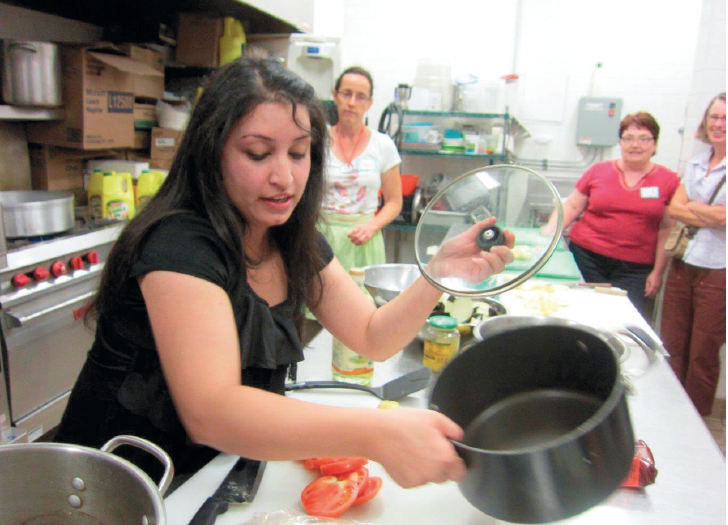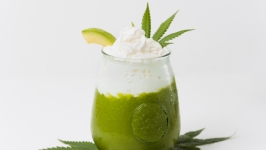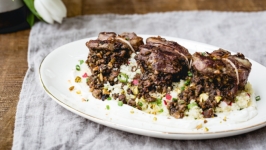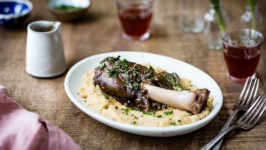Mosaic of Flavor: Cross-Cultural Connections Through Cooking
The air in Vermont has become decidedly crisp, and if the early sunsets and crunchy-leaf-laden hikes are any indication, the holiday season is on its way. For many, this time of year involves gathering with loved ones around a bustling kitchen and hot stove preparing comforting dishes and celebrating the simple gift of togetherness. This time-honored tradition of preserving and passing recipes from one generation to the next has an incredible power to unite myriad individuals regardless of their differences.
A Mosaic of Flavor, a local program in its third year, serves to support and expand on this ritual. The program is a collaboration between the Vermont Refugee Resettlement Program (VRRP) and City Market, designed to bring the cooking of new Americans, many of whom arrived within the last two years, to a wider audience and build connections across cultures.
“Many people have been shy to interact with new Americans, but in the cooking class the barriers dissolve,” said Laurie Stavrand, community partnership coordinator for VRRP. “We include cooks who do not speak English well by inviting them to come with a family member. In this way, someone who is a gifted cook is able to be celebrated for their skills and the community members learn how to engage with someone who is not fluent in English.”
Each year, Caroline Homan, City Market’s food and nutrition education coordinator, sits down with VRRP and devises ideas for upcoming classes.
“This year, I told Laurie that one theme that is very important to me is showing people how to cook traditional foods that are on the cusp of being replaced by convenience foods. Traditional foods are often healthy and nourishing in ways that the replacement foods are not—for example, making a stock from soup bones rather than using an instant bouillon cube. New Americans are often closer to these healthy traditional food practices than American cooks are, but they, too, are at risk of losing them,” Homan said.
Over the years the program has featured cooks (all immigrants, primarily refugees and asylees, a few are VRRP volunteers and all instructors have been resettled by VRRP or are VRRP staff) from Nepal, Bhutan, the Democratic Republic of Congo, Somalia, Burma and beyond. One of the goals of the program is to share foods from all of the cultures of people who have resettled in Vermont and to highlight a broad range of dishes and ingredients.
Often, the cooks have learned from experience and stories from their elders but have never cooked from a recipe, which is why a volunteer sits down with the cooks to come up with both a description and recipe for the dish he/she is about to demonstrate so that participants can re-create the dish at home.
The classes provide numerous benefits to participants and cooks alike. Participants have the opportunity to hear not only how to prepare a traditional dish from another culture but the story behind the cook him/herself. The participants learn how the instructor arrived in Vermont, their impressions of being here and what it was like where they came from.
“Many instructors spent decades in refugee camps; in the case of children and teenagers who sometimes accompany their parents, they were raised there. So their stories are really compelling,” Homan said.
Homan related that the dishes made in class are often more elaborate than they would have been able to prepare in camps and therefore are very special to them. Homan gets a lot of pleasure out of shopping for their dishes and bringing them fresh-tasting, local Vermont ingredients (meat and vegetables) whenever she can.
Instructors and participants aren’t the only ones who benefit from this program; a great school/community partnership has been forged as well. The Sustainability Academy, where the classes are held, often ends up incorporating recipes that were demonstrated in their kitchen—perhaps Nepalese dal or Burmese rice pilaf—into school lunch for their very ethnically diverse student body. “The community response has been fantastic,” Homan said. “Every time we hold one of these classes, people thank us for coordinating them. People are curious about the people and food from other cultures, and this is a great way to explore those and hopefully pique people’s interests to go further on their own, to pop in to the many ethnic markets, to volunteer with VRRP, or just to greet a neighbor with a wider smile.”
www.refugees.org/about-us/where-we-work/vrrp/our-services/workshops-trainings.html
JOIN A CLASS
If you are interested in participating in a Mosaic of Flavor class, check out City Market's website CityMarket.coop for information and to register. Classes cost $5 for City Market members, $10 for nonmembers. Classes are generally held at the Sustainability Academy in Burlington's Old North End. Upcoming classes include Burmese pumpkin and pork stew on Tuesday, November 19, and Nepalese momos on Tuesday, December 17.








